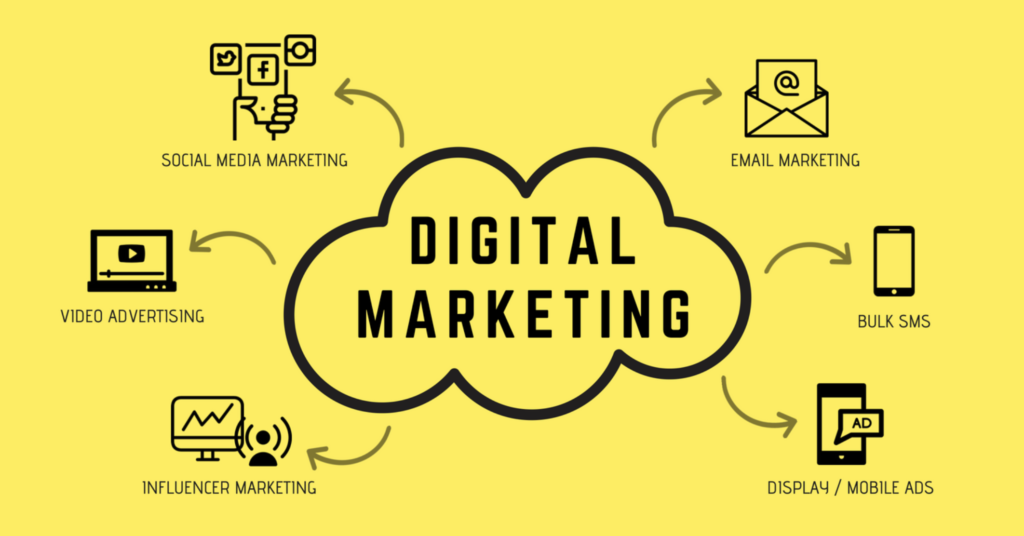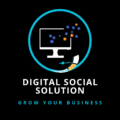Future of Digital Marketing
– In the ever-evolving landscape of digital marketing, staying ahead of the curve is essential for businesses. To remain competitive and relevant. As technology continues to advance at a rapid pace, the future of digital marketing holds exciting opportunities and challenges. In this comprehensive guide, we’ll explore the emerging trends, cutting-edge technologies, and innovative strategies. That will shape the future of digital marketing.

1. Evolution of Digital Marketing
Digital marketing has come a long way since its inception, evolving from basic banner ads and email campaigns to sophisticated. Data-driven strategies that leverage the power of AI, machine learning, and automation. The rise of social media platforms, mobile devices, and digital channels has transformed the way businesses connect with consumers. Offering unprecedented opportunities for engagement and interaction. Today, digital marketing encompasses a wide range of tactics and channels, including:
– Search engine optimization (SEO)
– Pay-per-click advertising (PPC)
– Content marketing
– Social media marketing
– Email marketing
– Influencer marketing
2. Emerging Trends in Digital Marketing :
Artificial Intelligence (AI) and Machine Learning:
AI-powered tools and algorithms are revolutionizing digital marketing by enabling marketers to analyze vast amounts of data. Personalize content, and automate repetitive tasks with unprecedented accuracy and efficiency. Machine learning algorithms can predict consumer behavior, optimize ad targeting, and improve campaign performance over time. Making AI an indispensable tool for modern marketers.
Voice Search Optimization:
With the growing popularity of voice-activated devices like smart speakers and virtual assistants. Optimizing content for voice search is becoming increasingly important for marketers. Voice search optimization requires a different approach than traditional SEO. Focusing on conversational keywords, natural language queries, and local search intent to rank higher in voice search results.
Video Marketing Dominance:
Video content continues to dominate the digital landscape, with platforms like YouTube, TikTok, and Instagram Reels driving engagement and brand awareness among consumers. Short-form videos, live streaming, and interactive content formats are particularly effective at capturing audience attention and fostering meaningful connections with viewers.
Augmented Reality (AR) and Virtual Reality (VR):
AR and VR technologies are opening up new possibilities for immersive brand experiences, allowing marketers to create interactive campaigns that blur the lines between the physical and digital worlds. AR-enabled shopping experiences, virtual product demonstrations, and branded AR filters are just a few examples of how brands are leveraging AR and VR to engage consumers in innovative ways.
Data Privacy and Compliance:
In an era of heightened concerns about data privacy and security, marketers must prioritize compliance with regulations like GDPR (General Data Protection Regulation) and CCPA (California Consumer Privacy Act) to build trust and maintain transparency with consumers. Transparency, consent management, and data protection measures are essential for earning consumer trust and avoiding potential fines or penalties for non-compliance.
3. The Role of Technology in Digital Marketing :
Marketing Automation:
Marketing automation platforms streamline repetitive tasks, such as email marketing, lead nurturing, and social media posting, freeing up marketers to focus on strategy and creativity. By automating routine processes and workflows, marketers can save time, improve efficiency, and deliver more personalized experiences to their target audience.
Big Data Analytics:
The abundance of data generated by digital interactions provides valuable insights into consumer behavior, preferences, and trends, allowing marketers to make data-driven decisions and optimize their campaigns for better results. Advanced analytics tools and techniques, such as predictive analytics, customer segmentation, and cohort analysis, enable marketers to uncover actionable insights and identify opportunities for growth.
Personalization and Customer Experience:
Advances in AI and machine learning enable marketers to deliver personalized experiences tailored to individual preferences, enhancing customer satisfaction and loyalty. Personalized content recommendations, dynamic pricing strategies, and targeted advertising campaigns are just a few examples of how brands are leveraging personalization to create more engaging and relevant experiences for their audience.
Blockchain Technology:
Blockchain technology has the potential to revolutionize digital marketing by increasing transparency, reducing fraud. And improving the security of online transactions and data exchanges. Blockchain-powered solutions, such as decentralized ad networks, secure data marketplaces, and transparent supply chains. Offer new opportunities for marketers to build trust, enhance accountability, and drive value for their customers.
4. Strategies for Success
Omnichannel Marketing:
A seamless omnichannel experience across multiple touchpoints—online and offline—is essential for engaging consumers and driving conversions in an increasingly connected world. By integrating marketing channels, data sources, and customer touchpoints, marketers can create cohesive. Personalized experiences that resonate with their target audience at every stage of the customer journey.
Content Marketing Excellence:
High-quality, relevant content that educates, entertains, and resonates with target audiences will continue to be the cornerstone of successful digital marketing strategies. By creating valuable content that addresses the needs, interests, and pain points of their audience, brands can establish thought leadership, build credibility, and nurture long-term relationships with their customers.
Influencer Collaboration:
Partnering with influencers and micro-influencers can help brands reach new audiences, build credibility, and foster authentic connections with consumers. Influencer marketing offers a powerful way to tap into the trust and influence of key opinion leaders in niche markets, driving brand awareness, engagement, and conversions through authentic, user-generated content.
Agile Marketing Approach:
Agile methodologies allow marketers to adapt quickly to changing market conditions, consumer preferences, and emerging trends, enabling them to stay ahead of the competition. By embracing an agile mindset and iterative approach to marketing, brands can test new ideas, experiment with different tactics, and optimize their campaigns based on real-time feedback and performance data.
Sustainability and Social Responsibility:
As consumers become more environmentally and socially conscious, brands that prioritize sustainability, diversity, and ethical practices will stand out and earn the trust of their audience. By aligning their values with those of their target audience and taking a stand on important social and environmental issues, brands can differentiate themselves in a crowded marketplace and build stronger, more meaningful connections with their customers.
Conclusion
The future of digital marketing is filled with promise and potential for brands that are willing to embrace change. Innovate, and adapt to the evolving needs and preferences of their audience. By staying ahead of emerging trends, leveraging cutting-edge technologies, and implementing strategic approaches that prioritize customer experience and authenticity. Businesses can thrive in an increasingly competitive digital landscape. As we look ahead to the future, one thing is clear: the possibilities are endless for those who are. Willing to embrace the opportunities that lie ahead in the dynamic world of digital marketing.
Grow Business Online : Building a Strong Online Presence
Grow Business Online : Building a Strong Online Presence

Pingback: On-Page SEO Optimization -Mastering Guide To Rank On Google